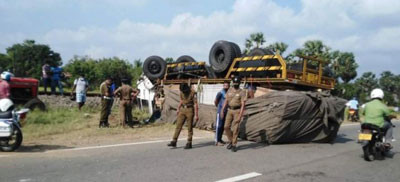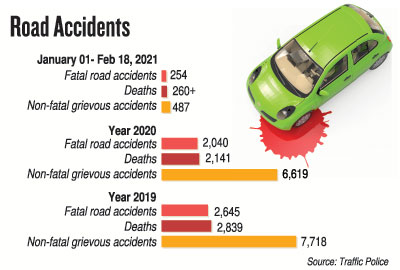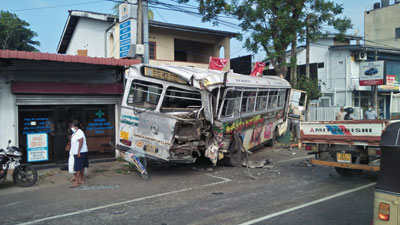News
Cheap and dangerous vehicle imports to be cut

An accident on the A9 road. Pic by Romesh Madusanka
In a bid to reduce road deaths, restrictions will be imposed on imports of vehicles that fail to meet safety standards, and a drug test will be compulsory before obtaining a driving licence.
“We have conducted a study and found out that one major contributing factor for road traffic accidents is low-quality vehicles with no safety gear,” Dilum Amunugama, State Minister of Vehicle Regulation, Bus Transport Services, Train Compartments and Motor Car Industry, said.
“From scooters to motorbikes, cars, tipper trucks and private buses, low-quality, Indian-made vehicles are involved in about 80 per cent of fatal road traffic accidents,” the minister said.
Traffic accidents have killed more people than the pandemic in the first two months of this year. Police statistics show that 254 fatal road traffic accidents were reported from January 1 to February 18 this year, while Health Ministry statistics revealed the number killed by coronavirus in the same period was 246.
Police said 487 other accidents this year resulted in serious injuries.
This week’s deaths include a 26-year-old motorist from Kosgoda whose motorbike collided with a van coming from the opposite direction along the Bandaragama-Panadura road.
 In addition, a 42-year-old motorist died when his motorbike collided with a tipper truck in Dankotuwa, a 47-year-old man and a 17-year-old girl died when the three-wheeler they were travelling in collided with a speeding car on the Pannala-Kuliyapitiya road, and a 27-year-old man who died when his motorbike collided head-on with a lorry in the Gokarella area.
In addition, a 42-year-old motorist died when his motorbike collided with a tipper truck in Dankotuwa, a 47-year-old man and a 17-year-old girl died when the three-wheeler they were travelling in collided with a speeding car on the Pannala-Kuliyapitiya road, and a 27-year-old man who died when his motorbike collided head-on with a lorry in the Gokarella area.
Two men died on admission to the Anuradhapura teaching hospital after their motorbike collided with a private bus in the Parasangaswewa area, and a young man from Katudeniya, Matale succumbed to injuries after his motorbike went out of control and toppled.
Mr. Amunugama said he plans to hold discussions with manufacturers such as Yamaha and Suzuki to begin local production of bikes and scooters made to suit Lankan roads, meeting safety requirements.
“With higher fines for drunk-driving, it has come to our knowledge that many drivers are resorting to other substances. Therefore a drug test will be made compulsory when obtaining a driving licences,” said Minister Amunugama, adding that a demerit system will be introduced for the new driving licence being introduced from mid-year.
Earlier this week, Police Spokesman DIG Ajith Rohana issued a warning over the increase in road traffic accidents, with the daily death toll increasing from six to 10, with most of the dead being motorcycle riders and pedestrians.
Co-Chair of the Sri Lanka Medical Association’s Expert Committee on Prevention of Road Traffic Crashes, and Professor of Community Medicine at the University of Peradeniya, Samath Dharmaratne, said with the mounting number of fatalities there is a need to form a presidential taskforce on preventing traffic accidents.
“At present there are many committees and institutions working on road accident prevention but there is not much coordination and no collaboration,” Professor Dharmaratne said.
“When individual institutions/persons come up with proposals and programmes, they tend to be short termed due to various powers that obstruct any implementation.”

An accident at Kandana. Pic by Rukman Pinto
Prof. Dharmaratne said more technology should be thrown into accident prevention CCTV cameras connected to the nearby police station should be set up even in the outstations and video evidence should be used to identify road rule breakers whether pedestrian or driver.
“We can assist in bringing in funds from overseas. But these projects should be implemented successfully and continuously,” he said.
Traffic police numbers needed to be increased to ensure road discipline.
“Seventy per cent of road traffic accidents can be prevented when a traffic police officer is present nearby,” Prof. Dharmaratne said.
National Transport Medical Institute Chairman Dr. Savindra Gamage said he understands that 50 per cent of tipper truck drivers and even some bus drivers on busy routes are addicted to alcohol and drugs.
“Tipper trucks are causing many deaths in rural areas by speeding and their drivers being under the influence of alcohol and narcotics,” Dr. Gamage said. “We propose introducing makeshift washrooms to carry out random urine tests on drivers. For this, we need laboratory staff and stronger testing mechanisms to prevent substance abuse.”
He emphasised the need for an across-the-board demerit system, especially for drink-driving offences.


